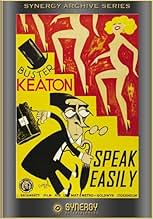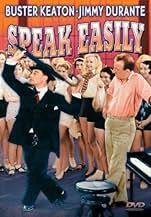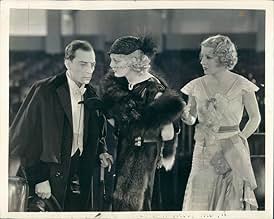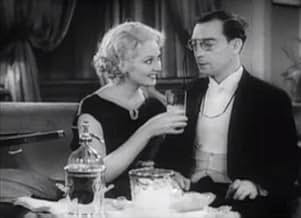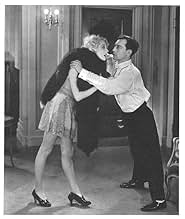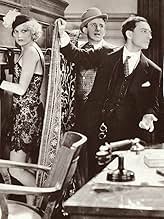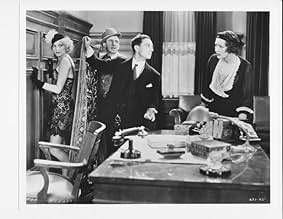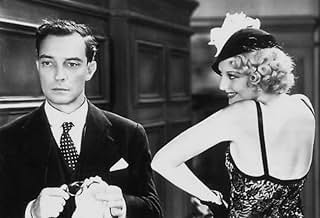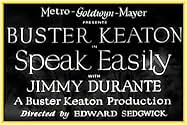IMDb-BEWERTUNG
5,8/10
1249
IHRE BEWERTUNG
Füge eine Handlung in deiner Sprache hinzuA timid professor inherits a large sum of money and decides to fund a terrible musical.A timid professor inherits a large sum of money and decides to fund a terrible musical.A timid professor inherits a large sum of money and decides to fund a terrible musical.
- Regie
- Drehbuch
- Hauptbesetzung
Loretta Andrews
- Chorus Girl
- (Nicht genannt)
Oscar Apfel
- Lawyer's Representative
- (Nicht genannt)
Reginald Barlow
- Billington
- (Nicht genannt)
Jack Baxley
- Tom - Sheriff's Deputy
- (Nicht genannt)
Sidney Bracey
- Jenkins
- (Nicht genannt)
Jim Farley
- Station Agent
- (Nicht genannt)
DeWitt Jennings
- Sheriff of Lincoln County
- (Nicht genannt)
Fred Kelsey
- Process Server
- (Nicht genannt)
Empfohlene Bewertungen
This film really, really depressed me. Not only was it completely unfunny, it did absolutely nothing with it's star Buster Keaton. It was odd to hear his voice, but even stranger to see him not do any of the routine that he's so famous for. Thelma Todd is also dreadfully waisted. She's beautiful, as always, but that's the film's only redeeming quality. And the story was atrocious. I've never seen a film so padded (well, maybe Blue Crush). This one should only be seen so people will see how hard the advent of sound struck film history. If it had come thirty years later, after more work and evolution, films like Speak Easily might never have been made.
What is the most harrowing movie ever made? The gynaecological nightmare of 'Cries and Whispers'? The acid psychodramas of Fassbinder? The discomfiting black comedy of 'Last House on the left? I'm sure for that portion of the film-loving public that tie their masts to the good ship Buster Keaton, there is only one answer - any one of his sound films.
I don't know what flayed my soul more poignantly in this movie - the grounding of Keaton's intricate and expansive physical art to humdrum slapstick; the painful hesitation of this master filmmaker with dialogue - not that he hasn't a lovely, comic voice, or that he can't make dialogue funny; it's just that the studio don't seem to have given him enough takes, and so he seems to be trying to remember his lines before he delivers, which only makes him - Keaton, not his character, look silly; or is it the humiliation of seeing Keaton caught up in a tawdry sex farce, when he has given us some of the richest accounts of romantic frustration in film?
No, I know what was most disturbing - having to watch Buster Keaton, cinema's greatest comedian, sit aside to observe Jimmy Durante doing his schtick. It is horrors such as this that get yer Dantes composing yer Infernos.
MGM seem to have got the curious idea that the best way to adapt Keaton to sound was to turn him into a Marx Brother, complete with verbal pedantry, elaborate, tedious 'clowning', shambolic slapstick, theatrical setting, triumph through chaos, and Thelma Todd. Keaton was just not that sort of comic, and where Groucho's malicious tongue and gleeful opportunism might just have made this plot work, Buster's socially inept professor can't, he is too studied and predictable.
What Buster needed was to be allowed experiment like Lang in 'M', or Rene Clair; he would never have tried to hold back the tide like Chaplin. When a film like 'The General' is alluded to - messing about with trains - the loss becomes even more apparent.
And the thing is, in patches amid the flat direction, the film isn't all that bad - there is an excellent jolt when a camera on the bus leaves Keaton alone at a railway station; and the denouement, if hardly original, is at least livelier than what went before. There is something almost endearing about the way Keaton slows down a plot that needs all the zip it can get.
There is a film in here about loneliness, emotionally paralysing order, the numbing effects of education etc., struggling to get out. The best way to appreciate this film is to watch not the narrative of Professor TZ Post, but of emasculated genius Buster Keaton, trapped in a prison of mediocrity, confounded by new technology, mocked by a malevolent fate (in this case the studio), retaining a stoical grace. Looked at like that, it becomes a kind of masterpiece.
I don't know what flayed my soul more poignantly in this movie - the grounding of Keaton's intricate and expansive physical art to humdrum slapstick; the painful hesitation of this master filmmaker with dialogue - not that he hasn't a lovely, comic voice, or that he can't make dialogue funny; it's just that the studio don't seem to have given him enough takes, and so he seems to be trying to remember his lines before he delivers, which only makes him - Keaton, not his character, look silly; or is it the humiliation of seeing Keaton caught up in a tawdry sex farce, when he has given us some of the richest accounts of romantic frustration in film?
No, I know what was most disturbing - having to watch Buster Keaton, cinema's greatest comedian, sit aside to observe Jimmy Durante doing his schtick. It is horrors such as this that get yer Dantes composing yer Infernos.
MGM seem to have got the curious idea that the best way to adapt Keaton to sound was to turn him into a Marx Brother, complete with verbal pedantry, elaborate, tedious 'clowning', shambolic slapstick, theatrical setting, triumph through chaos, and Thelma Todd. Keaton was just not that sort of comic, and where Groucho's malicious tongue and gleeful opportunism might just have made this plot work, Buster's socially inept professor can't, he is too studied and predictable.
What Buster needed was to be allowed experiment like Lang in 'M', or Rene Clair; he would never have tried to hold back the tide like Chaplin. When a film like 'The General' is alluded to - messing about with trains - the loss becomes even more apparent.
And the thing is, in patches amid the flat direction, the film isn't all that bad - there is an excellent jolt when a camera on the bus leaves Keaton alone at a railway station; and the denouement, if hardly original, is at least livelier than what went before. There is something almost endearing about the way Keaton slows down a plot that needs all the zip it can get.
There is a film in here about loneliness, emotionally paralysing order, the numbing effects of education etc., struggling to get out. The best way to appreciate this film is to watch not the narrative of Professor TZ Post, but of emasculated genius Buster Keaton, trapped in a prison of mediocrity, confounded by new technology, mocked by a malevolent fate (in this case the studio), retaining a stoical grace. Looked at like that, it becomes a kind of masterpiece.
Keaton fans, you will not "die a thousand deaths" if you view this. Nothing Keaton does is bad, if for nothing else then for his presence. That being said, Buster was a silent start who was best when doing stuff created by his own mind. By 1932, the silent era was dead and the studios owned the movies. That Buster Keaton of "Seven Chances" and "Steamboat Bill Jr." was no more. That could never be recreated.
Times changed, films changed, and Buster adapted. Better this Buster than no Buster.
The story is funny, and there is some amusing slapstick. Buster plays his role well, adds some Buster to it, and is believable as a clueless college professor. Jimmy Durante is larger than life, in a hammy sort of way, but it's a good contrast with Keaton if anything. The movie works, and the closing scenes the show on Broadway is madcap with a modicum of brilliance.
We can ask what if. What if the silent era had never ended? What if Keaton and Arbuckle had not been separated so suddenly? What if the studios had taken over the industry with their formulae? Look, this is a pretty good film. It's not Keaton being tragically reduced to nothing. (Such was never possible! The great ones always adapt.) The tragedy is what happened to Roscoe Arbuckle. What happened to Buster? He hung in there and made people laugh.
Times changed, films changed, and Buster adapted. Better this Buster than no Buster.
The story is funny, and there is some amusing slapstick. Buster plays his role well, adds some Buster to it, and is believable as a clueless college professor. Jimmy Durante is larger than life, in a hammy sort of way, but it's a good contrast with Keaton if anything. The movie works, and the closing scenes the show on Broadway is madcap with a modicum of brilliance.
We can ask what if. What if the silent era had never ended? What if Keaton and Arbuckle had not been separated so suddenly? What if the studios had taken over the industry with their formulae? Look, this is a pretty good film. It's not Keaton being tragically reduced to nothing. (Such was never possible! The great ones always adapt.) The tragedy is what happened to Roscoe Arbuckle. What happened to Buster? He hung in there and made people laugh.
While it is true that SPEAK EASILY doesn't hold a candle to the genius of Keaton's best films, neither is it worthless as some have suggested. Outside pressures (namely MGM and his deteriorating family life) held Keaton back from performing at the inspired level he might have. SPEAK EASILY's main weakness lies in MGM forcing an uninspired pairing of Keaton with a vaudeville comic like Durante. The tension between Buster's physical comedy (which is never allowed to ignite as it once had) and Durante's verbal punning is something that never really works. Keaton's characters in all of the MGM talkies seem, for lack of a better word, dense. The inherent cleverness that Buster showed in his silent work was totally abandoned. Never again would Buster show the bravado, daring and quickness he was famous for. Instead, he would be shoe-horned by MGM into a series of roles as loser, victim and sap. For all those inherent problems, SPEAK EASILY still contains at least two slapstick sequences that prove Keaton could be just as funny in his talkies as he was in his silent work. The 'drunken seduction' with Thelma Todd's gold-digger is very funny. Miss Todd proves herself not only a fine comedienne, but shows excellent chemistry with Keaton. Also, Buster's utter, and totally inadvertent, destruction of the Broadway play during it's opening night performance is hysterical and features some fine stunt gags. Those looking for the sublime genius of THE GENERAL or SHERLOCK JR. will invariably be disappointed. That 'Buster' was long gone by this point in his career. SPEAK EASILY should be viewed as an enjoyable programmer that kept Buster working, if not at his peak, still as a capable gag man and entertainer. Admiring fans with an open mind will find much to enjoy here
Thelma Todd brings burlesque to a script replete with gags, some of them funny, as when Keaton carries her folded up looking like a filled bag. Pre-Code license pervades and Todd takes this to new realms. The Broadway show as conceived is quite brilliant with snow flakes, costumes, sets, dancers, music, balloons and genuine art, for a few moments, before Keaton tears it all apart. The Producers, Night at the Opera, owe somewhat. You don't get such a steady stream of sight gags and stunts, as with the trains, unless it's Keaton. Not many big laughs, but surprising in its disregard for conventions of good taste audiences might expect to see lived up at an MGM movie. Hedda Hopper does a great job as the tasteful Mrs. Peets.
Wusstest du schon
- WissenswertesSecond of three films in MGM's pairing of Buster Keaton and Jimmy Durante as a comedy team. The other pictures were Wer andern keine Liebe gönnt (1932) and Bier her! (1933).
- PatzerWhile Professor Post (Buster Keaton) is dragged by the train, clutching his luggage, his hat flies off and he is unable to grab it. In the next shot, his hat is once again firmly on his head.
- Zitate
Eleanor Espere: Tell me, Timmy. Have you ever seriously thought of marriage?
Professor Post: Yes... that's why I'm single.
- VerbindungenFeatured in Das gibt's nie wieder (1974)
- SoundtracksGood Times Are Here Again
(1932) (uncredited)
Music by David Snell and Charles Maxwell
Lyrics by Samuel Marx
In the score during the opening credits and at the end
Played on piano by Jimmy Durante and sung by the chorus at the opera house
Played often in the score
Top-Auswahl
Melde dich zum Bewerten an und greife auf die Watchlist für personalisierte Empfehlungen zu.
Details
- Laufzeit
- 1 Std. 22 Min.(82 min)
- Farbe
- Seitenverhältnis
- 1.37 : 1
Zu dieser Seite beitragen
Bearbeitung vorschlagen oder fehlenden Inhalt hinzufügen

